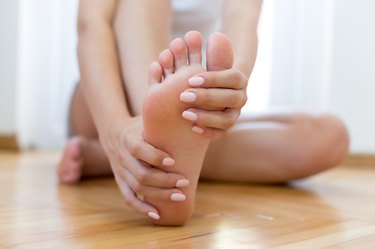
Sore arches after running — in one or both feet — is one of the most common afflictions distance runners face. While this kind of injury often resolves quickly, it can linger for weeks or even months if you don't address the underlying cause or causes and take active steps to speed healing.
In most cases, sore arches in runners result from chronic stress, but pain may also result from a traumatic injury such as stepping in a hole.
Video of the Day
Video of the Day
Read more: Can Fallen Arches Be Fixed With Exercise?
Arch Pain After Running
In most cases of arch pain after running, especially when the pain is close to the heel, the culprit is plantar fasciitis. The plantar fascia is a band of tissue connecting the heel to the ball of the foot that helps support the arch, according to the Cleveland Clinic. This structure often becomes inflamed from the mechanical stresses imposed by running. This injury normally comes on gradually and manifests in only one foot.
Other causes of foot arch pain that are not plantar fasciitis include a stress fracture of the navicular bone of the foot and inflammation of the posterior tibial tendon, which runs down the calf and attaches to the back of the arch.
Risk Factors for Sore Arches
Given the plantar fascia's location and function, the factors predisposing runners to plantar fasciitis are predictable, according to the Mayo Clinic. Heavier runners are more susceptible than others, especially in the wake of sudden weight gain. Running on uneven surfaces, in footwear lacking adequate support, and over hilly terrain all contribute to the development of plantar fasciitis.
Flat feet, high arches and tight Achilles tendons can also trigger the development of plantar fasciitis, as can a rapid increase in total workload. The same factors predispose runners to posterior tibial tendinitis, while stress fractures most often result from rapid increases and mileage and too much running on hard surfaces.
Sore Arches After Running: Treatment
Foot arch pain home remedies, such as ice massage of the affected area, can help decrease your symptoms, according to Harvard Health Publishing. Over-the-counter anti-inflammatory drugs, such as ibuprofen and naproxen sodium, can reduce both pain and inflammation; ask your doctor for recommendations concerning appropriate dosage levels.
Putting cushioned insoles in your running shoes can allow you to keep running even during the healing process, and avoiding hills and rough terrain is essential as well.
Speed work tends to aggravate plantar fasciitis, so stick to slow, steady running during the convalescent period. Posterior tibial tendonitis is typically treated with physical therapy, immobilization or surgery, while a navicular stress fracture requires about six weeks of immobilization in a boot and, in some cases, surgical intervention.
Read more: Arch-Building Exercises for Flat Feet
Help Prevent Arch Pain
To prevent a recurrence of arch pain or to help ensure that you never incur it in the first place, be certain that you're running in shoes well-suited to your particular foot anatomy. Stretch regularly to keep your ankle, Achilles tendon and calf muscles limber.
Try not to run every day on concrete or asphalt, switching to smooth soft surfaces — including a treadmill — whenever possible. If possible, avoid wearing high heels and try to maintain a healthy body weight.
Was this article helpful?
150 Characters Max
0/150
Thank you for sharing!
Thank you for your feedback!